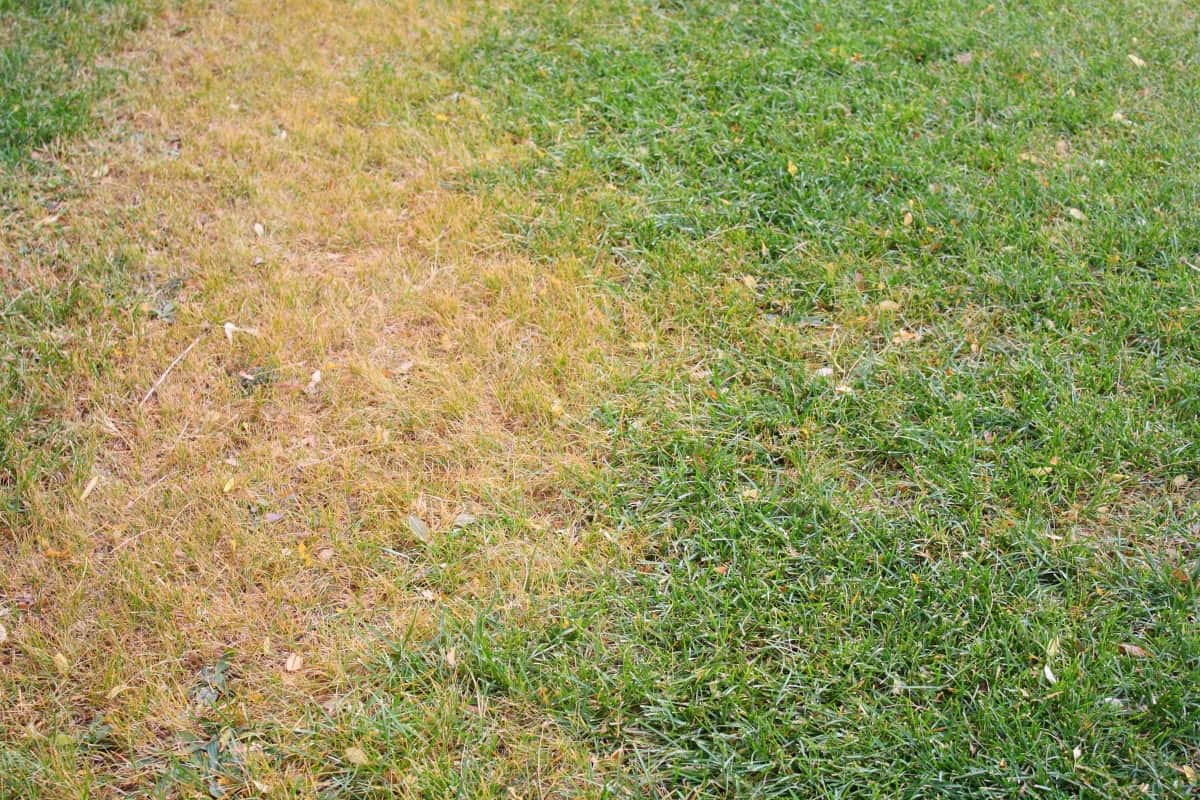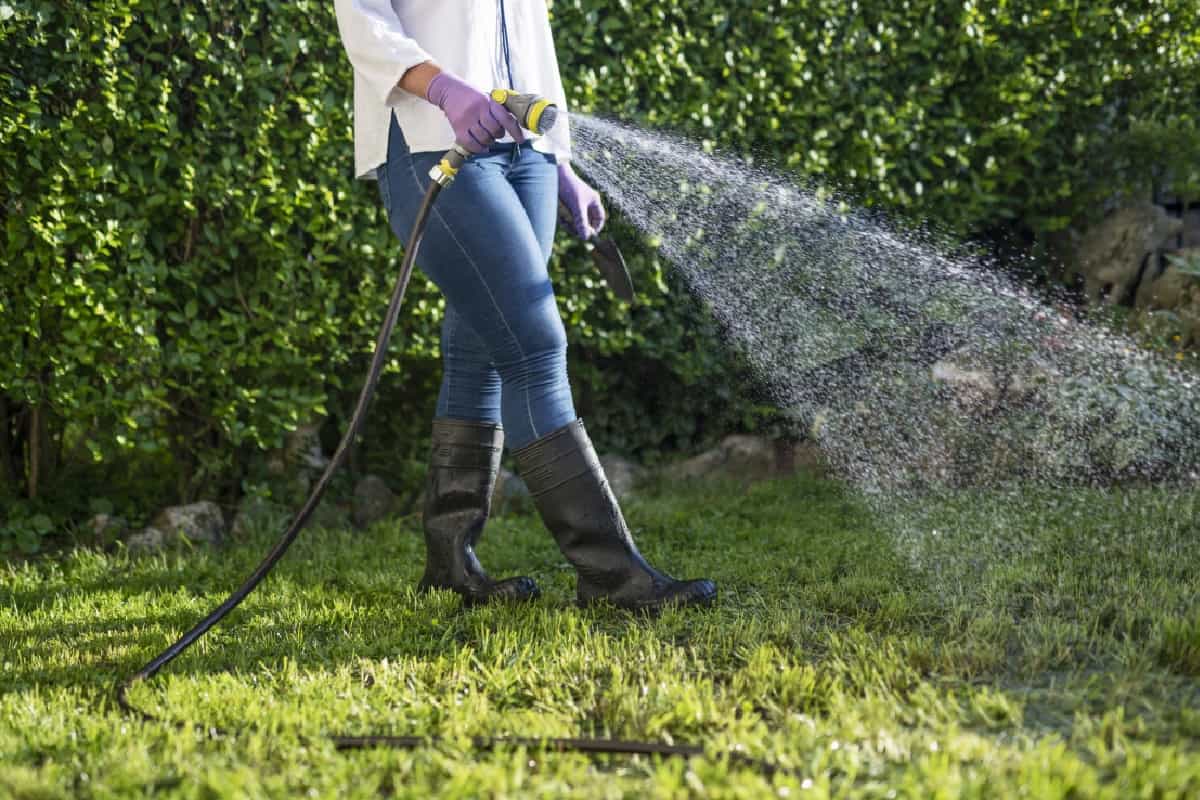Various things can affect a lawn, from watering schedules to soil pH levels. However, one of the most critical aspects of lawn care is using Epsom salt. We have researched this product thoroughly and found a few interesting facts about it. With that said, let's get right into it below!
Generally, you should apply Epsom salt during spring to ensure healthy and green growth. Lawns grow leaves during this time, becoming more photosynthetic and green as the growing season continues.
Additionally, here are some of the popular methods to apply Epsom salt on a lawn:
- Mix with lawn fertilizer
- Apply with a sprinkler system
- Add to your garden hose
- Apply with a lawn sprayer
- Spread by hand
Epsom salt is a mineral supplement used to improve the health and appearance of plants, soil, and lawns. Read on to discover how to apply Epsom salt to your yard for the best results!
![Epsom salt in a hand with gloves, When To Apply Epsom Salt To Lawn [And How To]](https://gardentabs.com/wp-content/uploads/2022/08/Epsom-salt-in-a-hand-with-gloves-When-To-Apply-Epsom-Salt-To-Lawn-And-How-To-1.jpg)
What Happens To Your Lawn During Spring?
Spring is a magical time as it is a period of renewal and growth in nature. It is also the time when the grass starts to grow.
Plants' growth is directly related to the amount of sunlight that reaches the Earth and the ground's warmth. So, the weather conditions that prevail in spring generally favor plants and tree growth.
The first few weeks of spring can be tough on your lawn.
Because the grass hasn't had time to grow and gain nutrients, it is vulnerable during this time. But this is the best time to take care of the grass since it is developing new green leaves.
Fertilizing your lawn in early spring ensures the grass gets the nutrients it needs to keep growing strong and healthy throughout the year.
You can use any fertilizer for your lawn, as long as it has the proper nutrients. However, it is best to add nitrogen-rich fertilizer since it nourishes your grass.
Aside from fertilizing your lawn, many factors determine how fast and thick it will grow and how healthy it will look. One of them is the application of Epsom salt to your lawn.
Check out this lawn fertilizer on Amazon.
What Does Epsom Salt Do To Your Lawn?
Epsom salt is commonly used in lawns as a soil amendment. But it is not considered a fertilizer. It's a natural soil conditioner that can improve the overall health of your property by supplementing the lacking nutrients.
Some people also use it to help kill weeds since its magnesium sulfate content makes it a weed deterrent.
In addition, magnesium has several benefits that can make your lawn greener and healthier. This includes improving the root's absorption rate and boosting certain plants' growth.
See this Epsom salt on Amazon.
How To Apply Epsom Salt To Your Lawn
Epsom salt can be effective if you want a greener lawn in the spring. The benefits of adding Epsom salt to your yard are numerous, and you can apply it in many ways.
Here are some common ways to use Epsom salt on a lawn:
1. Mix with lawn fertilizer
Mixing Epsom salt with lawn fertilizer is one of the most common ways to apply Epsom salt to your lawn. This saves you the time and effort you would expend in applying the salt and fertilizer separately.
Mix both into the lawn spreader and run the spreader until you cover the entire lawn.
Here's a video showing how to apply Epsom salt using a lawn spreader:
Check out this lawn spreader on Amazon.
2. Apply with a sprinkler system
Sprinklers are a convenient way to water your lawn. You can add Epsom salt to the water as it runs through the sprinkler.
3. Add to your garden hose
When watering your lawn, you can add Epsom salt to the water as it runs through your garden hose.
Check out this garden hose on Amazon.
4. Apply with a lawn sprayer
A lawn sprayer is a convenient way to water your lawn. You can add Epsom salt to the water as it sprays.
See this lawn sprayer on Amazon.
5. Spread by hand
If you are not a fan of any of the above options, you can always go old school and spread Epsom salt directly on your lawn.
This video will direct you on how to do it:
What Is The Recommended Epsom Salt To Soil Ratio?
Generally, a half pound of Epsom salt will be enough to cover a 100-square-foot area. However, there is no flat rule about the amount of Epsom salt needed since it does not impact the soil's acidity.
But, there is a catch. Epsom salt is highly acidic, so it can burn your plants if you apply too much of it. Your safest bet is to use Epsom salt in smaller amounts and observe. Then, add more as needed.
Because of its acidic nature, Epsom salt can help prevent pests from harming your garden. It is a natural pesticide that is safe for you and your family to use.
In addition, too much magnesium may inhibit calcium uptake in plants, which deters plant growth. Healthy soil should have at least 80 to 100 lbs of magnesium per acre.
Does Epsom Salt Have An Expiration Date?
Epsom salt does not have an expiry date since it does not lose effectiveness after some time. If you have been using Epsom salt, then there is no need to worry about losing its effectiveness.
You can use it until you empty the bag.
How Do You Know If Your Lawn Needs Magnesium?
Magnesium deficiency in your garden can result from poor soil quality, a high pH, and other environmental factors.
All plants and soil organisms require magnesium to thrive, and a lack of it can cause stunted growth, yellowing of leaves, and death. Furthermore, magnesium enriches your soil, so its deficiency can cause more plant problems than mentioned.
The best way to fix a magnesium deficiency in your garden is to nourish your soil with a magnesium-rich soil additive such as Epsom salt.
Why Is My Grass Turning Yellow?
Plants use nitrogen to create the chemical compounds necessary for healthy leaf color and growth. The plants with high nitrogen levels are dark green, lush, and thick, while those with low nitrogen levels are yellowish or yellowish-green.

You need to fertilize the soil to encourage nitrogen uptake by your plants. The nutrients in fertilizer are necessary for plant growth and development. But Epsom salts do not provide these nutrients.
While Epsom salts are an excellent choice for gardening enthusiasts who want to add more minerals to their soil, they are not substitutes for fertilizers.
Epsom salts may be popular for household and professional use, but their benefits are often overstated. Knowing what you're getting into when using Epsom salts is essential.
When Is The Best Time To Water Your Lawn?
Watering the lawn is essential to maintaining a healthy lawn during summer when the sun is shining and the temperatures are high.

It's always ideal for watering your lawn consistently. By "consistent," we mean watering the lawn at about the same time every day.
It is wise to water the lawn before 10 a.m. This time is suitable because the sun's rays don't penetrate the surface of your yard as much, allowing the water to soak into the soil more quickly.
Overwatering your lawn can kill it. But this is a common problem that homeowners often face. While it may seem like a quick way to improve your lawn's appearance, it causes more problems than it solves.
The soil becomes inhibited when your lawn is too wet, and the roots do not absorb as much oxygen.
While many people don't realize that they overwater their lawns until it's too late, others have seen the results of overwatering them and have learned that they need to pay attention to their watering habits.
Should You Water Grass After Mowing?
While it is true that you can water the lawn after mowing, it is not always required. Watering the grass could cause issues if the soil is already wet. It will create fungal diseases that can kill the grass and your entire lawn.
So, if you decide to water the lawn, wait until the soil is dry. This will prevent any potential issues.
To Wrap Things Up
Epsom salt is a mineral-based product that is a natural treatment for grass and weeds. It has a variety of benefits when it comes to lawn care, including:
- It controls weed growth and reduces the risk of weeds coming back after treatment;
- It works for all grass types and can be applied at any time of year, especially during spring;
- It is natural and organic and will not harm your lawn or plants.
We hope that this post has provided you with enough information so that you can apply Epsom salt to your property.
Made it to the end? Check out these helpful related posts:





